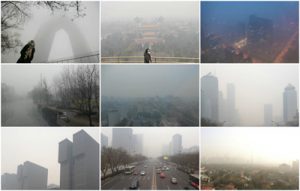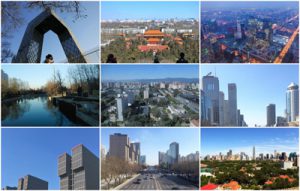Polluted Air May Pollute Our Morality

Exposure to air pollution, even imagining exposure to air pollution, may lead to unethical behavior, according to findings published in Psychological Science, a journal of the Association for Psychological Science. A combination of archival and experimental studies indicates that exposure to air pollution, either physically or mentally, is linked with unethical behavior such as crime and cheating. The experimental findings suggest that this association may be due, at least in part, to increased anxiety.
“This research reveals that air pollution may have potential ethical costs that go beyond its well-known toll on health and the environment,” says behavioral scientist Jackson G. Lu of Columbia Business School, the first author of the research. “This is important because air pollution is a serious global issue that affects billions of people—even in the United States, about 142 million people still reside in counties with dangerously polluted air.”
Previous studies have indicated that exposure to air pollution elevates individuals’ feelings of anxiety. Anxiety is known to correlate with a range of unethical behaviors. Lu and colleagues hypothesized that pollution may ultimately increase criminal activity and unethical behavior by increasing anxiety.
In one study, the researchers examined air pollution and crime data for 9,360 US cities collected over a 9-year period. The air pollution data, maintained by the Environmental Protection Agency, included information about six major pollutants, including particulate matter, carbon monoxide, nitrogen dioxide, and sulfur dioxide. The crime data, maintained by the US Federal Bureau of Investigation, included information about offenses in seven major categories, including murder, aggravated assault, and robbery.
The researchers found that cities with higher levels of air pollution also tended to have higher levels of crime. This association held even after the researchers accounted for other potential factors, including total population, number of law enforcement employees, median age, gender distribution, race distribution, poverty rate, unemployment rate, unobserved heterogeneity among cities (e.g., city area, legal system), and unobserved time-varying effects (e.g., macroeconomic conditions).
To establish a direct, causal link between the experience of air pollution and unethical behavior, the researchers also conducted a series of experiments. Because they could not randomly assign participants to physically experience different levels of air pollution, the researchers manipulated whether participants imagined experiencing air pollution.
In one experiment, 256 participants saw a photo featuring either a polluted scene or a clean scene. They imagined living in that location and reflected on how they would feel as they walked around and breathed the air.
On a supposedly unrelated task, they saw a set of cue words (e.g., sore, shoulder, sweat) and had to identify another word that was linked with each of the cue words (e.g., cold); each correct answer earned them $0.50. Due to a supposed computer glitch, the correct answer popped up if the participants hovered their mouse over the answer box, which the researchers asked them not to do. Unbeknownst to the participants, the researchers recorded how many times the participants peeked at the answer.
The results showed that participants who thought about living in a polluted area cheated more often than did those who thought about living in a clean area.

Polluted scenes from Beijing (Lu et al. Psychological Science)

Nonpolluted scenes from Beijing (Lu et al. Psychological Science)
In two additional experiments, participants saw photos of either polluted or clean scenes taken in the exact same locations in Beijing, and they wrote about what it would be like to live there. Independent coders rated the essays according to how much anxiety the participants expressed.
In one of the experiments conducted with university students in the US, the researchers measured how often participants cheated in reporting the outcome of a die roll; in the other experiment with adults in India, they measured participants’ willingness to use unethical negotiation strategies.
Again, participants who wrote about living in a polluted location engaged in more unethical behavior than did those who wrote about living in a clean location; they also expressed more anxiety in their writing. As the researchers hypothesized, anxiety level mediated the link between imagining exposure to air pollution and unethical behavior.
Together, the archival and experimental findings suggest that exposure to air pollution, whether physical or mental, is linked with transgressive behavior through increased levels of anxiety.
Lu and colleagues note that there may be other mechanisms besides anxiety that link air pollution and unethical behavior. They also acknowledge that imagining experiencing air pollution is not equivalent to experiencing actual air pollution. They highlight these limitations as avenues for further research.
Ultimately, the research reveals another pathway through which a person’s surroundings can affect his or her behavior:
“Our findings suggest that air pollution not only corrupts people’s health, but also can contaminate their morality,” Lu concludes.
Co-authors on the research include Julia J. Lee of the Stephen M. Ross School of Business at the University of Michigan, Francesca Gino at Harvard Business School, and Adam D. Galinsky at Columbia Business School.
All materials have been made publicly available via the Open Science Framework. The design and analysis plans for Study 3b were preregistered. The complete Open Practices Disclosure for this article is available online. This article has received badges for Open Materials and Preregistration.





Comments
Interesting research. I’ve often wondered how on earth people who could easily afford cleaner alternatives still continue to burn wood. This, of course, very seriously pollutes them, their families and all their neighbours. It is very difficult to fathom such unethical, selfish and anatagonistic behaviour. Maya Angelou said”when you know better you do better”. Sadly some, even when informed, do nothing, or continue to assault.
APS regularly opens certain online articles for discussion on our website. Effective February 2021, you must be a logged-in APS member to post comments. By posting a comment, you agree to our Community Guidelines and the display of your profile information, including your name and affiliation. Any opinions, findings, conclusions, or recommendations present in article comments are those of the writers and do not necessarily reflect the views of APS or the article’s author. For more information, please see our Community Guidelines.
Please login with your APS account to comment.